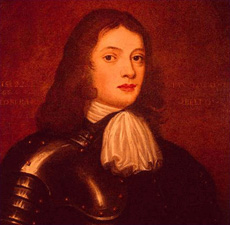William Penn

William Penn (October 14, 1644–July 30, 1718) founded the Province of Pennsylvania, the British North American colony that became the U.S. state of Pennsylvania. The democratic principles that he set forth served as an inspiration for the United States Constitution. Ahead of his time, Penn also published a plan for a United States of Europe, "European Dyet, Parliament or Estates."
No person who shall confess and acknowledge one Almight God...and that professeth him or herself obliged in conscience to live peaceable under the civil government, shall in any case be molested or prejudiced for his or her conscientious persuasion or practice, nor shall he or she at any time be compelled to frequent or maintain any religious worship place or ministry whatever.
Any differences between planters and natives shall be ended by 12 men, that is, by six planters and six natives, that so we may live friendly together... That the Indians shall have liberty to do all things to the improvement of their ground and providing sustenance for their families, that any of the planters shall enjoy...
The above quotations are posted in the hall of Arch Street Friends (Quaker) Meeting House. Today the building serves as a place of worship and spirit-led work for Philadelphia Quakers. It also stands in historic Philadelphia as a symbol for William Penn and the ideals that shaped his government and society the Holy Experiment.
Arch Street Friends (Quaker) Meeting House
Pennsylvania, Quakers, and William Penn are inseparable. Visit the Arch Street Friends Meeting House and through diorama cases, videos, and historic interpretation by experienced docents, explore the ideals that shaped Penn 's colony. This daring "Holy Experiment" was dedicated to religious liberty, equality and peace. During Welcome Week, we will focus on this most diverse, enlightened and socially conscious colonial city in America and on William Penn, his life, his work, and his relevance today.
William Penn Resources
- Brief History of William Penn
- William Penn Timeline
- William Penn Quotations
- "Some Fruits of Solitude" (excerpts)
- "England's Present Interest Considered"
- The Founding of West Jersey
- William Penn in the Tower of London
- Penn's letters from Prison
- William Penn on the Conduct of Business
- William Penn visits the Indians
- The Life of George Fox
- The Life of James Logan
- The Life of Margaret Fell
- Scharf, Thomas J., History of Delaware, 1609-1888. Volume One- pp. 68-81.
